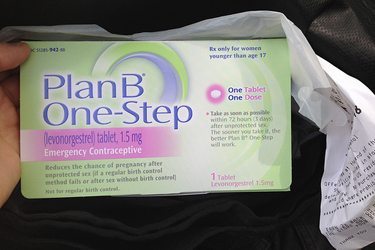Forget “Having it All”: What About Just Having Access to Plan B?
It is an outrage that not only may it be difficult to physically access Plan B but also lack of information regarding emergency contraceptives can serve as an obstacle for young women who have been sexually assaulted.

We’ve heard plenty of political rhetoric about reproductive rights in recent months. From anti-choice laws to “legitimate rape,” every male politician seems to have an opinion about women’s bodies.
It’s time we refocus this conversation. We need to stand back and examine the effect political decisions are having on real women—not just characters in politicians’ talking points.
As a recent female college graduate, entering into the professional world, I often hear debate about whether women can “have it all:” career, kids, and a healthy marriage. It’s an important question, but there’s an inherent privilege implied by asking it. So what if we forget “having it all” for a moment and instead ask if women can at least have the things we need? What about access to Plan B (a form of emergency contraception), for instance?
To answer that question, I spoke with Charon Asetoyer, a health activist working with young women on the Yankton Reservation in South Dakota. She is leading the battle for reproductive justice in the Native-American community and ultimately for women everywhere.
“Native women cannot get Plan B through their primary health-care provider, Indian Health Service. We’re looking at more than one in three Native women being raped in her lifetime, and Indian Health Service is doing absolutely nothing to address these residual affects of rape. That is a human rights violation being committed against Native women everyday in this country,” said Asetoyer.
Very few Indian Health Service (IHS) pharmacies administer over-the-counter Plan B, and many do not carry it at all. Asetoyer says that what 26-year-old Lakota Sunny Clifford experienced is all too common.
“I wasn’t even aware I could get Plan B from IHS,” Clifford, who lives on the Pine Ridge Reservation, told me. This past July, she called her local clinic to request the emergency contraceptive. Although U.S. women ages 17 and older are legally entitled to access Plan B over the counter, Clifford’s clinic in Kyle, South Dakota, told her that she would have to get a prescription from the clinic’s midwife, who was not in the office. Her other options were to drive to Wanbli Health Center or Pine Ridge, each of which is about 50 miles away.
“I sat there and cried a little bit. It was really frustrating for me. I was sitting there and I didn’t have a dollar to my name. I didn’t have a car. I felt powerless,” said Clifford.
Asetoyer explained that often mothers will walk into her office wanting to know when Plan B will be widely accessible. “They want more information about Plan B so they can talk to their daughters so that when they are sexually assaulted, they’ll know about it and be able to request it,” she said.
It’s frightening how something so horrific can become the norm; these women expect that one day their daughters will be sexually assaulted. Asetoyer added that it’s “shocking when a mother says, ‘when my daughter is sexually assaulted.’ And that is absolutely unacceptable in every other community, and the government is doing little of anything to help address this.”
Not only may it be difficult to access Plan B, but also lack of information regarding emergency contraceptives can serve as an obstacle for young women who have been sexually assaulted.
Most women living in non-rural areas can simply walk into their local pharmacy and request Plan B. So what does this have to do with U.S. women at large? As Asetoyer explained, “These issues are not only affecting Native women. Anytime a woman is denied a right, it affects all women, because if they can get by with it with a small segment of the population in the country then they’re gonna be able to get by with it with another group.”
We need to be careful when we discuss this question of “having it all.” What does it mean, and who are we talking about? Many of us can walk into a pharmacy and request emergency contraception without worrying that the person at the counter will tell us to travel hours away, but other women struggle to control their reproductive systems in a way that more privileged women take for granted every day. The truth is that no woman can count on “having it all” as long as some women continue to be denied basic rights.
